Posted in category "Popes"
For many Catholics, the Devil and hell have faded from sight. The only time we ever hear of Satan is when he is referred to during baptismal vows, Gospel readings of his encounters with Jesus, or during old reruns of The Exorcist or The Omen on TV.
So U.S. Catholic commentators and ordinary folk were surprised a few months ago when Pope Benedict referred to the Devil as instigating the media exposure of priestly sexual abuse.
He said the “new radiance of the priesthood,” which he saw emerging from the Year for Priests, would not be pleasing to the “enemy” who “would have preferred to see it disappear, so that God would ultimately be driven out of the world. And so it happened that, in this very year of joy for the priesthood, the sins of priests came to light–particularly the abuse of the little ones…”
“All evil is due to the intervention of the Devil, including pedophilia,” confirmed Fr. Gabriele Amorth, 85, an exorcist in the Diocese of Rome. Fr. Amorth is the author of An Exorcist Tells His Story and An Exorcist: More Stories. A third book, Memorie Di Un Esorcista was published this year. 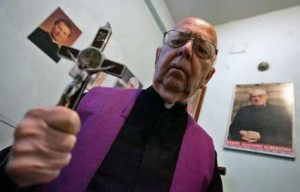
The sex abuse crisis engulfing Pope Benedict XVI and the Vatican, he said, was the work of Satan who had even “infiltrated the Vatican corridors.” Fr. Amorth emphatically stated: “Legions of demons have lodged there.” “The majority of those in the Vatican do good work, but Pope Paul VI talked about the ‘smoke of Satan’ infiltrating the Vatican as long ago as 1972.”
He claimed another example of satanic behavior was the Vatican “cover-up” over the deaths in 1998 of Alois Estermann, the commander of the Swiss Guard, his wife and Corporal Cedric Tornay, a Swiss Guard, who were all found shot dead. “They covered up everything immediately,” he said. “Here one sees the rot.” (Read my post on the murders here.)
Fr. Amorth asserted that “Lust, success and power are the three great passions on which the Devil insists.”
The exorcist has claimed in his books and interviews that Vatican clergy are involved in Satanic sects. “There are priests, monsignors and also cardinals!” The exorcist claims he got his information from “those who have been able to relate it to me because they had a way of knowing directly. And it’s something ‘confessed’ most times by the very demon under obedience during the exorcisms.”
Father Jose Antonio Fortea Cucurull, another well-known demonologist and exorcist, said that Fr. Armoth had “gone beyond the evidence” in claiming that Satan had infiltrated the Vatican corridors. “Cardinals might be better or worse, but all have upright intentions and seek the glory of God,” he said. Some Vatican officials were more pious than others, “but from there to affirm that some cardinals are members of Satanic sects is an unacceptable distance.”
Sex, power, politics and the Devil have been around the Catholic Church for centuries. Two examples that quickly come to mind are the case of Cardinal Richelieu and Fr. Urbain Grandier as described in The Devils of Loudun; and the burning of (Saint) Joan of Arc with the connivance of Bishop Pierre Cauchon.
More recently, the Devil at work in the Church was raised by a pope. In his homily given on the Feast of Saints Peter and Paul on June 29, 1972, Pope Paul VI made a famous remark that “from some fissure the smoke of Satan has entered the house of God.” 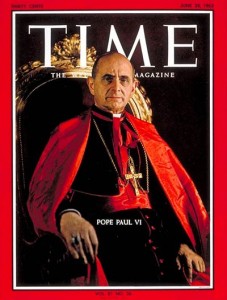
The full text of the homily was not reproduced in the Vatican collection of Paul VI’s teachings (Insegnamenti di Paulo VI Vol. X, 1972). Instead, what’s included is a narrative summary of the homily, with occasional direct quotations attributed to him.
Since we don’t have the pope’s words in context, but someone’s retelling of them, it makes it unclear exactly what the pope meant, adding a layer of ambiguity and mystery. But what was Pope Paul VI intending to warn us about when he said “the smoke of Satan has entered the house of God”?
There are a lot of theories.
-A number of ultra traditionalists believed the Second Vatican Council and liturgical reforms that followed it were the work of the Devil.
– The blogger, Jimmy Atkin, in a very interesting and well written post, posits that Pope Paul VI was responding to the cultural crisis of the 1960s and 70s and its impact on the Church. Read it here.
– Virgilio Cardinal Noe, 86, Master of Liturgical Ceremonies during the Pontificates of Paul VI, John Paul I and John Paul II, disclosed in an interview with Petrus, his inside information on the comment. 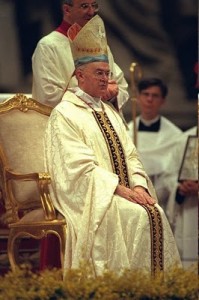
“You from Petrus, have gotten a real scoop here, because I am in a position to reveal, for the first time, what Paul VI desired to denounce with that statement. Here it is: Papa Montini, for Satan, meant to include all those priests or bishops and cardinals who didn’t render worship to the Lord by celebrating badly (mal celebrando) Holy Mass because of an errant interpretation of the implementation of the Second Vatican Council. He spoke of the smoke of Satan because he maintained that those priests who turned Holy Mass into dry straw in the name of creativity, in reality were possessed of the vainglory and the pride of the Evil One. So, the smoke of Satan was nothing other than the mentality which wanted to distort the traditional and liturgical canons of the Eucharistic ceremony.”
Now we know the Pope hated guitar Masses, too…
Cardinal Noe had the reputation for being a big fussy and exacting stickler for ceremony. This may have influenced how he interpreted a private or public comment from Paul VI combined with his own distaste for modern Masses.
-The most delicious theory is that there are actual Satanists in the Vatican! In his novel, The Windswept House – A Vatican Novel (1996), author Fr. Malachi Martin vividly described a ceremony called “The Enthronement of the Fallen Angel Lucifer” supposedly held in St. Paul’s Chapel in the Vatican, but linked to concurrent satanic rites here in the U.S. on June 29, 1963, barely a week after the election of Paul VI. In the novel, before he dies, a pope leaves a secret account of the situation on his desk for the next occupant of the throne of Peter, a thinly-disguised John Paul II.
On pages 492-93 of “The Windswept House” Fr. Martin went another step to link gay and lesbian religious to Satanists during the reign of Paul VI. 
“Suddenly it became unarguable that now during this papacy, the Roman Catholic organization carried a permanent presence of clerics who worshipped Satan and liked it; of bishops and priests who sodomized boys and each other; of nuns who performed the “Black Rites” of Wicca and lived in lesbian relationships…every day, including Sundays and Holy Days, acts of heresy and blasphemy and outrage and indifference were committed and permitted at holy Altars by men who had been called to be priests. Sacrilegious actions and rites were not only performed at Christ’s Altars, but had the connivance or at least the tacit permission of certain Cardinals, archbishops…”
In a June 9, 1997 article in The John Birch Society publication, New American, Martin confirmed that the ceremony did indeed occur as he had described it in the book. “Oh yes, it is true; very much so,” the magazine reported he said. “But the only way I could put that down into print is in novelistic form.”
Well, how could Fr. Malachi Martin be so sure it had occurred unless he had been there himself?
Through all these tendrils of smoke I see ugly lines of slander and innuendo developing: it is the devil who is responsible for dissent, discord and abuse. Secular culture, gay priests and women religious are its willing servants. They and the cardinals and bishops who support them are suspect of being Satanists or in league with them.
In 1995 Princeton University professor and noted theologian, Dr. Elaine Pagels, wrote “The Origin of Satan.” This book argues that the figure of Satan became a way for orthodox Christians to demonize their religious opponents, namely, other Christian sects and Jews. She traces the development of Satan in the Jewish community from a sort of roving agent acting on God’s behalf–always obstructing but not always evil–to an increasingly evil force identified more and more with intimate enemies, members of one’s own community with whom one is in conflict.
The reemergence of the Devil is timely for a certain segment of Catholics: clerics who want to absolve themselves for the root causes of the sex abuse crisis and their cover-up; people who never agreed with the changes initiated by Vatican II; the fractionalizing of Catholics over issues of sexuality, the nature of sin, clerical authority, roles of the laity, worship, and the increasing visibility of gay people and their families in society and the church. Surely Satan is behind all that?
In the novel, “The Name of the Rose”, Brother William of Baskerville, a former inquisitor, tries to explain to the abbot why there is a need in his monastic community for a supernatural explanation for a murder and undercurrent of fear: “Who am I to express judgements on the plots of the Evil One, especially,” he added, and seemed to want to insist on this reason, “in cases where those who had initiated the inquisition, the bishop, the city magistrates, and the whole populace, perhaps the accused themselves, truly wanted to feel the presence of the Devil? There, perhaps was the only real proof of the presence of the Devil was the intensity with which everyone at that moment desired to know he was at work…”
“Are you telling me, then,” the abbot said in a worried tone, “that in many trials the Devil does not act only within the guilty one but perhaps and above all in the judges?” 
After multiple killings, several attempts to murder Brother William, and a slew of witchcraft and heresy accusations, the monastery is destroyed by fire. In an attempt to trap William and his novice, Adso of Melk, Venerable Jorge de Burgos knocked over a candle to put the room in darkness. Instead, the candle ignited a blaze which consumed the entire library and many of the monks.
William had discovered Jorge, the ancient librarian, had poisoned the pages of a book by Aristotle he deemed too dangerous to read. This poison killed any monk turning its pages. William deduces that the library is kept hidden because such advanced knowledge, coming from pagan philosophers, is difficult to reconcile with Christianity. 
As they watched the library tower burn (and Venerable Jorge along with it) Brother William explained to his novice that unlike church teaching, the Devil is not merely a tempter of forbidden sensuality and knowledge: “They lied to you. The Devil is not the Prince of Matter; the Devil is the arrogance of the spirit; faith without smile, truth that is never seized by doubt.”
Can’t you see few people–right now–that fit that description?…The Glenn Becks of the world, Pastor John Hagee, ex-Bishop Joseph Martino of Scranton, Fr. C. John McCloskey of Opus Dei..We see their images in print, on blogs, on TV and sometimes–in the mirror.
There are defenses against Satan and his works. The usual antidote to pride is its opposite–humility–but one that springs from a willingness and effort to accommodate different kinds of people and stay together in bonds of prayer and friendship.
Adso observed: “We are fragile creatures, I said to myself; even among these learned and devout monks the Evil One spreads petty envies, forments subtle hostilities, but all these are as smoke then dispersed by the strong wind of faith, the moment all gather in the name of the Father, and Christ descends into their midst.”
On September 8, 2001 Cardinal Dario Castrillon Hoyos, prefect of the Congregation of the Clergy, wrote a letter to Bishop Pierre Pican of Bayeux-Lisieux, warmly applauding him for refusing to report a priest accused of sexual abuse to the civil authorities. The priest, Abbot Rene Bissey, was sentenced in 1998 to 18 years in jail for the repeated rape of a boy and sexual assaults on ten other boys. Bishop Pican received a three month suspended sentence for withholding information.
“I congratulate you for not denouncing a priest to the civil administration,” Cardinal Castrillon wrote. “You have acted well and I am pleased to have a colleague in the episcopate who, in the eyes of history and of all the other bishops in the world, preferred prison to denouncing his son and priest.”
In it, the cardinal said relations between bishops and priests were not simply professional but had “very special links of spiritual paternity.” Bishops therefore had no obligation to testify against “a direct relative,” he stated. The letter cited Vatican documents and an epistle of Saint Paul to bolster its argument about special bishop-priest links.
“To encourage brothers in this episcopate in this delicate domain this Congregation will send copies of this letter to all bishops’ conferences,” Castrillon Hoyos wrote.
Spanish newspapers reported that Cardinal Castrillon told an audience at a Catholic university in Murcia, Spain on April 16, 2010 that he had consulted with Pope John Paul II and showed him the letter. He said the pope had authorized him to send the letter to bishops worldwide.
This letter languished in relative obscurity since 2001. It was posted on the web by Golias, a French Roman Catholic lay organization based in Lyon, France. It can be seen here.
The letter caught fire when SNAP (Survivors Network of those Abused by Priests) caught wind of it and a planned visit to the United States by Cardinal Castrillon. He was invited to preside at a traditional Latin Mass at the National Shrine of the Immaculate Conception in Washington, DC on April 24th, honoring the fifth anniversary of the inauguration of the Holy Father. It was to be the first time in almost 50 years that the Tridentine Mass would said from the Shrine’s high altar.
The Paulus Institute had been planning the Mass for three years to honor Pope Benedict XVI, who allowed the Traditional Latin Mass to be more widely celebrated early on in his papacy. The group said it had originally asked Cardinal Castrillon to celebrate the Mass because he was a prominent voice in the movement to restore the traditional liturgy.
Paul King, president of the Paulus Institute, told reporters that the decision to choose another celebrant for the Mass had a lot to do with potential picketers and the costs associated with heavier security. SNAP said they would picket the Mass if Cardinal Castrillon was the celebrant. 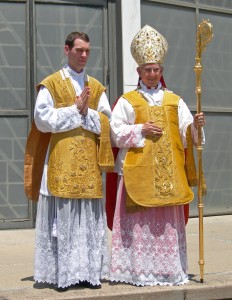
When asked if he thought Cardinal Castrillon was disappointed, King responded, “I think so. He’s an interesting person and a devout person.”
On April 22, 2010 radio interview Cardinal Castrillon continued to defend his letter: “The law in nations with a well-developed judiciary does not force anyone to testify against a child, a father against other people close to the suspect. Why would they ask that of the church? That’s the injustice.”
” John Paul II, that holy pope, was not wrong when he defended his priests so that they were not, due to economic reasons, treated like criminal pedophiles without due process.”
The 2001 letter congratulating a bishop for hiding a pedophile priest was not Cardinal Castrillon’s first impolitic decision.
From 2000 to 2009 he also a ran the Pontifical Commission, Ecclesia Dei, dealing with traditionalist rebels who broke from Rome in 1988 and were excommunicated.
He conducted the talks that led to the January 2009 decision to readmit the four banned bishops of the Society of Pius X to the Church, which caused an uproar when it emerged that one of them, Richard Williamson, had denied the Holocaust. The controversy was highly embarrassing to Pope Benedict, who said he did not know about Williamson’s views, even though they could easily be found on the internet.
A staunch conservative from Columbia, the steely-eyed Castrillon, 80, drew the wrath of victims of American-priest sex abuse for denying that the Catholic Church had any particular problem with pedophiles in its ranks. Castrillon headed the Congregation for the Clergy from 1996 to 2006.
The cardinal accused unnamed insiders and enemies elsewhere of feeding the sex abuse scandals hurting the Catholic Church.
“Unfortunately there are…useful idiots inside (the church) who lend themsevles to this type of persecution,” Castrillon said. “But I’m not afraid to say that in some cases it’s within the Masons, together with other enemies of the church.”
He would not give details, however, saying that “since I’m not stupid, I don’t tell everything I know. Only drunks, children and idiots tell, and I’m not a child, nor a drunk, nor stupid.”
Pope John Paul II used to whip himself with a belt and sleep on a bare floor to bring himself closer to Christ.
He had a particular belt for self-flagellation according to the Italian-language book, Why He Is a Saint: The True John Paul II Explained by the Postulator of the Cause of Beatification” (Rizzoli Publications). A postulator is an official who presents a plea for beatification or canonization in the Catholic Church. 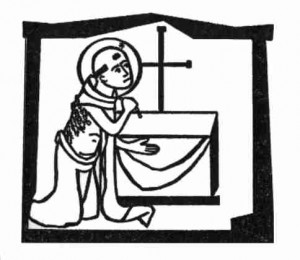
In the book, the postulator, Polish Monsignor Slawomir Oder, together with journalist Saverio Gaeta, director of the magazine Famiglia Christiana, compile several testimonies that reveal details about the pope’s life.
“As some members of his own entourage were able to hear with their own ears, both in Poland and in the Vatican, Karol Wojyka flagellated himself,” the book says. “…in his wardrobe, among his soutanes, he had hanging a particular belt for trousers that he used as a whip, and which he would ensure was always taken to Castel Gandolfo.”
The fact that John Paul II whipped himself in “bodily penance” was first revealed last November by Sister Tobiana Sobodka, a Polish nun who worked for Pope John Paul in his Vatican apartment and at the papal summer residence at Castel Gandolfo in the hills south of Rome.
In Santo Subito (A Saint Now) by Andrea Tornielli, the Pope’s biographer and Vatican correspondent of Il Giornale, Sister Sobodka said: “We could hear it – we were in the next room at Castel Gandolfo. You could hear the sound of the blows when he would flagellate himself. He did it when he was still capable of moving on his own.”
He must have been really going at it hard if they could hear him in the next room!
When I read the Pope was flagellating himself I immediately thought of three other Catholic self-flagellators:
– The albino monk from Opus Dei in Dan Brown’s The Da Vinci Code. He beat himself to chastise his body.
– The monk Berengar, the assistant librarian in The Name of the Rose. He whipped himself in penance for his homosexual desires and affairs. He pressured the young illuminator, Adelmo, for sex in exchange for access to a forbidden book. Adelmo committed suicide. Berengar, doubly guilty, had a loud whipping session within hearing of visitors Brother William of Baskerville and his novice, Adso of Melk. 
– The chanting, wailing penitent flagellators in Ingmar Bergman’s The Seventh Seal, inflicting self-punishment with birch wands in hopes God will spare them the Black Plague.
“When members of or former member see the monk go at it in the movie (The Da Vinci Code), they just burst out laughing, it’s so nutty, said the Rev. Michael Barrett, a priest of Opus Dei.
“There is no blood, no injury, nothing to harm a person’s health, nothing traumatic,” he added. “If it caused any harm, the Church would not allow it,” he wrote on the Opus Dei website when the movie came out in 2006.
“This voluntarily accepted discomfort is a way of joining oneself to Jesus Christ and the sufferings he voluntarily accepted in order to redeem us from sin. The Da Vinci Code‘s masochist monk, who loves pain for its own sake, has nothing to do with real Christian mortification,” Fr. Barrett said.
Do religious self-flagellators receive a perverse sense of gratification of the flesh by causing it pain? 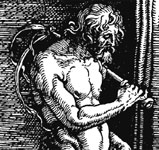
Not according to retired prefect of the Congregation for Saints’ Causes, Cardinal Jose Saraiva Martins. In the case of saints who subjected themselves voluntarily to rigorous penance, these practices had nothing to do with psychological imbalance, he emphasized.
He said: “The saints are in the first place very normal persons. If this wasn’t so they wouldn’t be able to be saints. There are many saints who did penance and saw this as a way to bring their body under control; it has nothing to do with psychology.”
One of our most recent saints, St. Josemaria Escriva, the founder of Opus Dei, didn’t shy away from pain: “Blessed be pain. Loved be pain. Sanctified be pain…Glorified be pain! (The Way, 208). “If you realize that your body is your enemy, and an enemy of God’s glory since it is an enemy of your sanctification, why do you treat it so softly?”
Future historians and investigative journalists may uncover what was Pope John Paul II’s connection to Opus Dei. How was he helpful to them? How were they useful to him? It appears he adopted their self-mortification practices.
But would Pope John Paul II been more “saintly” if he would have spent the time instead comforting a sick child in a hospital; stand outside an abortion clinic and offer his hand and financial support to an unmarried, pregnant woman about to enter; or make it known to the corps of elite Catholic business titans and government officials clean water for drinking, sanitation and agriculture was needed for all people, but especially the poor who have no other alternatives or place to go?
I think so. Sometimes it is much easier to beat yourself up than do the right thing.
Conservative Catholics must be more a little dismayed at the thought of John Paul the Great whipping his back and buttocks with a belt. I know I would be. What would I say if my children asked me about it? Sheesh.
For more flagellation on the Pope’s behavior:
CAUTION CHURCH AHEAD: “Pope beats himself up for his failings: Unfortunately, they’re the wrong failings.
Slate: The Allure of the Whip by Niklaus Largier. The article also discusses Historia flagellatium written in 1700 by the abbe Jacques Boileau.
Here’s the video on YouTube of Silas, the Opus Dei monk, chastising his body. Would you say there was an erotic element to this ritual?
And for all of you busy, multi-tasking, but still pentitent-minded Catholics, don’t miss: Great Inventions: The Flagellator – Convenient Hands-Free Self- Flagellation.
On the night of Monday, May 4, 1998, Swiss Guard Lance Corporate Cedric Tornay, 23, killed Lt. Col. Alois Estermann, 43, and his Venezuelan wife, Gladys Meza Romero, 49. After they were dead, Tornay knelt, put his service revolver in his mouth and pulled the trigger. 
The Vatican handled the autopsy and investigation of the crime by itself, without asking for help from Italian officials. They considered the case clear-cut. “It was a fit of madness in a person with very peculiar psychological characteristics,” papal spokesman Joaquin Navarro-Valls said the day after the killings. “That is the only hypothesis,” a Vatican official confirmed. “There is no reason to advance any alternative.”
Estermann and his wife were given a splendid funeral, concelebrated by 16 cardinals and 30 bishops. Before the service, Pope John Paul II made a point of praying at all three caskets, which were displayed, side by side, for viewing. Tornay was given a separate funeral in a chapel in the small church of St. Anne’s.
Cardinal Secretary of State Angelo Sodano said the Requiem Mass for Col. Estermann and his wife at St. Peter’s Basillica, a rare honor for laymen. In his homily Cardinal Sodano said, “In times like these we feel above all the need to be silent.” The Estermanns had been married 16 years. They did not have any children.
The official explanation of their deaths didn’t make sense to people who knew Cedric Tornay. A flurry of articles and books followed the murders.
Bugie di sangue di Vatican (Blood Lies in the Vatican) by the “Disciples of Truth” was printed by a tiny publisher in Milan. It was reputed to have been written by a group of disaffected priests inside the Vatican. They claimed that Estermann was the victim of a struggle for control of the Swiss Guard – which had been in charge of papal security for the past five centuries – between the secretive, traditionalist Catholic movement Opus Dei and a masonic power faction ensconced in the Curia. Estermann and his wife were members of Opus Dei. The director of the Holy See press office, Joaquin Navarro-Valls, is a member as well.
John Follain, a British investigative journalist and Sunday Times correspondent for Italy and the Vatican authored City of Secrets: The Truth behind the murders at the Vatican. It was published in 2003 by William Morrow & Co. He followed several threads in trying to establish a motive for the murder. One of them was a homosexual love affair gone sour.
One source Follain met and interviewed was Italian writer and art historian, professor Massimo Lacchei. In his 1999 book, Verbum Dei, Verbum Gay (God’s Word, Gay Word) Lacchei offers ten short stories about homosexuality in the ranks of Catholic clergy. The book would have passed generally unnoticed had Lacchei not called a press conference to announce that the two Swiss guard officers in the chapter “Mass in a Private Chapel” were in fact Estermann and Tornay. In the book they appeared as “Major Jorg” and “Lieutenant Kaspar.” “This is not fiction, they (the stories) are based on real encounters” Lacchei told reporters.
The story is an account, spiced up with a couple of lewd ancedotes, of an all-male party Lacchei attended in 1997 at the home of an elderly and important Roman politician. The most eagerly awaited guests were two officers of the Swiss Guard. The story opens with the guests waiting expectantly for the two officers. They arrive, Mass is celebrated, and then, over a meal, the others sit in rapt attention as they relate the story of their relationship. 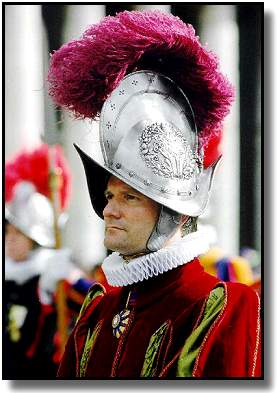
Lacchei said he had no proof that the two Swiss Guards were lovers, but their presence at the gay brunch–and their behavior there–certainy made him think so. “They were so intimate and friendly for a subordinate and a captain,” he said. Lacchei told Follain of a second, chance meeting with Tornay in April 1998, a month before his death. Lacchei had been out walking his dog on the Via della Conciliazione, the avenue leading to St. Peter’s, when he saw Tornay and invited him home. Tornay confided that Estermann had betrayed him. He saw Estermann in an embrace with another guard in the changing rooms of the barracks. “I can forgive, but never forget” Tornay said.
A former Vatican employee told Follain a story about a homosexual chaplain of the Swiss Guard. The chaplain had several affairs with members of the corps. Whenever his advances were rebuffed, he would dress himself in civilian clothes and go to Roma Termini Station to find male prostitutes. “The ex-employee told me,” Follain related, “that a Swiss Guard plucked up his courage and complained about him to the elderly, wheelchair-bound Cardinal Andrzej Maria Deskur, who has been the pope’s closest friend ever since they studied at the seminary together. ‘We will do nothing,” Deskur muttered. ‘The chaplain is digging his own grave.'” The chaplain later died of AIDS.
As Tornay and Estermann’s relationship deteriorated, Estermann began to persecute Tornay. Estermann’s refusal to grant Cedric Tornay the Benemeriti medal for three-years service–a routine award– may have sparked the killings. Hurt and fustrated, there was no where Tornay could go to unburden or be heard. He could not discuss his relationship with Estermann. Officially, homosexuals do not exist in the Swiss Guard. “I had no choice but to hid my homosexuality,” said an ex-guardsman named Steiner. “I soon realized that the only way to survive as a homosexual in the heart of the Church was to keep it invisible.”
Tall and thin, with a short-cropped sandy beard, Steiner did not return to Switzerland after his service but stayed in Rome and opened up a flower shop. “Some people choose to live in the Vatican because for them it is like living in a giant, protective cocoon,” he said. “But for many people life in the Vatican is just a big pretense, because the truth is that under all those cassocks and the robes there are individuals who want to live normal lives, who have desires that are absolutely normal–including sexual ones.”
Vatican spokesman Vavarro-Valls took pains to deny rumors of a sexual motive for the killings. Navarro, who said he had known the Estermanns well, insisted: “”They were a model couple. The fact that they didn’t have children wasn’t important, because they dedicated their time to charity work.”
Others disagreed. “The relationship could not be other than one of a homosexual nature,” Ida Magli, a prominent anthropologist, told the Roman daily Il Messaggero. “”The Holy See wanted to close a case in a hurry, perhaps out of a need to hide a sad, worrisome truth.”
Lesbian and gay saints have contributed in their individual ways to the life of the Church. Two examples are Saint Alcuin, who openly professed his emotional and sexual passion for several brother monks; and Saint Bridget of Ireland, who deeply loved the young nun, Darlughdach, who slept with her and sometimes functioned as her ambassador.
There are also gay icons–the handsome youth, Saint Sebastian, and Saint Joan, a woman who dressed herself in men’s clothing, became a warrior, and defied the gender role and expectations of her time.
Of course, there is also Saint Peter Damien with his fixation on gay male sex. He is the epitome of a self-hating homosexual who persecutes others of his kind in order to avoid detection, and punish the objects of his own desire.
Here are two clues to help identify gay and lesbian saints: 1) did they enter religious life partially to avoid marriage; and 2) does part of their story involve a special “friend” they had in religious life?
Today’s lesson: Saint Galla of Rome. 
In his Dialogues, Pope Saint Gregory the Great speaks of a holy woman of Rome named Galla, who had been married for less than a year when her husband died. Refusing to remarry, the young widow resolved to devote the rest of her life to God. To protect her beauty againt men’s attention, it is said she disguised herself as a man and God gave her a beard.(!)
Joining with a community of women living near St. Peter’s Basilica, caring for the poor and sick, this wealthy and pious woman founded a convent and a hospital. She is reputed to have once healed a young deaf and mute girl by blessing some water, and having the girl drink from it.
As she lay stricken with breast cancer, Galla kept two candles burning each night at the foot of her bed, for Gregory explains, “She hated darkness, being a friend of light, physical as well as spiritual light.”
It was between these two candles that one night the Apostle Saint Peter appeared in a vision to Galla. The dying woman asked him: “Have my sins been forgiven?” Smiling, Peter nodded yes and answered, “They are forgiven. Come.”
But Saint Galla now requested, “I beg you to let Sister Benedicta come with me.” Peter told her, “Sister Benedicta will follow you in thirty days.” Three days later, Galla died, and a month later, Benedicta.
Rest together in peace.
Death: c. 550 A.D.
Feast Day: October 5
During Pope Benedict XVI’s recent trip to the Czech Republic, the pope emphasized that Europe had been deeply shaped by its Christian roots. Invoking his own background as an academic, he warned the Czech academic community against allowing a modern-day preoccupation with reason to cancel out faith. 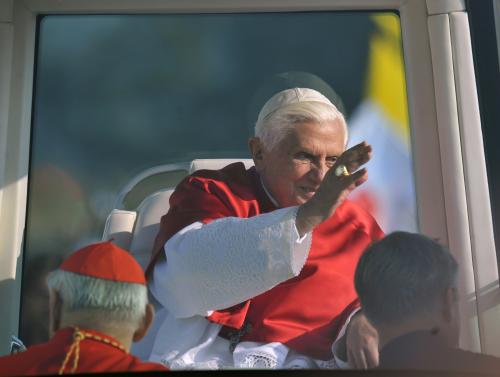
“What will happen if our culture builds itself only on fashionable arguments, with little reference to a genuine historical intellectual tradition, or on the viewpoints that are most vociferously promoted and most heavily funded,” he asked.
In another address to Czech academics in Prague, the pope inveighed against the perils of relativism. He also underlined the need to mend “the breach between science and religion.”
Some young Christians said they felt alienated by the pope’s “moral absolutism” who appeared more intent on preserving the church’s traditions than an adapting to modern times.
“A pope’s visit should energize all Christians,” said Daniel Barton, 25, a youth leader in the country’s largest protestant denomination, “but I find his social conservatism quite ridiculous.”
“The Vatican and this pope have been absolutizing the traditions of the past without thinking of the reasoning behind these rules, which is what Jesus was fighting against.”
The very week that he returned, an editor of Zenit, a news agency specializing in coverage of the Holy Father, life in the Holy See, and events of interest to the Church, published an interview with Jesuit Fr. James V. Schall, a professor of political philosophy at Georgetown University in Washinton, DC. Fr. Schall is also the author of The Mind that is Catholic: Philosophical and Political Essays. The book was published by Catholic University of America Press in November 2008. The book explores the habits of being that allow one to use the tools of faith and reason to explore all things seen and unseen. 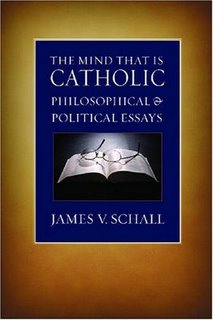
“It is characteristic of the Catholic mind,” states Fr. Schall, “to insist that all that is knowable and considered by us in our reflections on reality. ”
“It was Aristotle who warned us that the reason we do not accept the truth even when it is presented to us is because we do not really want to know it. Knowing it would force us to change our ways. If we do not want to change our ways, we will invent a “theory” whereby we can live without the truth.”
“The ‘primary’ source of the Catholic mind is reality itself,” said Fr. Schall, “including the reality of revelation.” “The source of our knowledge,” he goes on to say, “is not a book but experience of being and living, an experience that will often include those whose lives are already touched by grace.” 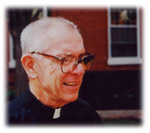
Pope Benedict XVI is an intellectual, an academician who happens to be pope. A bookish man, and probably the most conservation and ecologically-minded pontiff we have ever had, you would think he would be open to nature being a source of revelation of God and humanity–but he is not. He is stiffly fixated on homosexual sex and relationships as unnatural.
In his December 2008 address to the Curia, the Vatican’s central administration, the Pope himself described behavior beyond traditional heterosexual relations as “a destruction of God’s work”.
He said the Roman Catholic Church had a duty to “protect man from the destruction of himself” and urged respect for the “nature of the human being as man and woman.”
The pontiff added: “The tropical forests do deserve our protection. But man, as a creature, does not deserve any less.”
Can lived experience can be an instrument of God’s revelation? If so, what is God saying about the increasing openness and acceptance of loving gay and lesbian relationships and commitments? That is something for the Catholic Mind, including the Holy Father’s, to grapple with–not dismiss out-of-hand as a product of relativism.
I hope he picks up this book.
A few days ago, Pope Benedict XVI asked the Italian Bishops’ Conference for an “assessment” after the editor of its newspaper, Avvenire, was accused by another publication of homosexual behavior and harassment.
“His Holiness has asked for information and an assessment of the current situation,” said a statement posted last week on the website of the bishops’ group, which publishes the daily Avvenire.
Yesterday, Dino Boffo, director of the Italian Catholic newspaper Avvenire, resigned–ostensibly in the wake of a tumultuous feud with Italian Prime Minister Silvio Berlusconi. 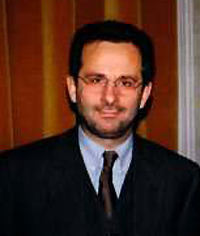
The row erupted after Boffo ran a series of stories in Avvenire that criticized the immigration policies and personal life of the prime minister.
Letters from readers complained that a Roman Catholic newspaper had a moral duty to denounce divorce, consorting with teenage girls, naked poolside parties and the prime minister being caught on tape telling a prostitute to wait for him in “Putin’s bed” while he showered.
Boffo, the editor, began to weigh in. “People have understood the unease, the mortification, the suffering this arrogant neglect of sobriety has caused the Catholic Church,” Boffo wrote last month.
Under cover of a paper owned by his brother, Paolo Berusconi, the prime minister retaliated.
Under a front page banner headline, Il Giornale, ran an article accusing Avvenire, the official newspaper of the Italian Bishops Conference, of running a “moralistic campaign” against Prime Minister Silvio Berlusconi, 72. The article went on to scrutinize Dino Boffo, 57, Avvenire‘s top editor, claiming he had a homosexual affair and had accepted a plea bargain in 2004 for harassing the wife of his lover.
The Il Giornale article openly admitted that the article was in response to Boffo’s criticisms of Berlusconi’s private life, and called Boffo a hypocrite.
In a statement, Mr. Boffo described the report as an “absurd” attempt to smear his reputation. Mr. Boffo described himself as “the first victim” in the 2001 harassment case. He didn’t elaborate on the matter.
After the story appeared, Cardinal Tarcisio Bertone, the Vatican Secretary of State and deputy to Pope Benedict XVI, telephoned Mr. Boffo to offer his “solidarity.”
He was joined by Cardinal Dionigi Tettamanzi, the Archbishop of Milan, who said he had offered Mr. Boffo his “esteem and gratitude.”
Cardinal Angelo Bagnasco, the head of the bishops conference, described the attack on Mr. Boffo as “disgusting.”
Cardinal Stanislaw Dziwisz, former secretary to the late Pope John Paul II and now Archbishop of Krakow in Poland, said it was “the first time a Catholic paper has been attacked with such violence.” He added that he was “very worried by the moral decadence into which Italy is sliding because of the behavior of certain important political leaders.”
Il Giornale ‘s attack escalated when another editorial aimed at the Catholic Church itself, mocking not just the “hypocrisy” of sexually active priests with “weak flesh,” but even the “Mitteleuropean” accent of Pope Benedict XVI, a German.
Earlier in the week Il Giornale reported how Dino Boffo had been successfully sued by a woman who claimed that he had tried to steal her husband from her in 2001. The matter, which involved a couple from Terni, near Perugia, was settled out of court in 2004 with Boffo agreeing to pay a small fine. The article claimed Boffo had been listed by police in document as a gay man “noted for this kind of activity.” (It’s not clear–harassment or chasing married men??)
The story dragged in the Italian goverment with Robert Maroni, the Interior Minister, was forced to telephone Mr. Boffo to assure him no such police document existed.
Officials said the alleged police document appeared in reality to be an “anonymous letter” sent to Italian bishops earlier this year.
Prime Minister Berlusconi and his allies had hoped to patch up his relationship with the Catholic Church after months of articles linking Berlusconi with teenage models and “spicy” parties. He denied he paid for sex after an Italian prostitute went public with claims that she slept with Mr. Berlusconi at his residence in Rome.
“Gossip isn’t enough to crucify someone,” Vittorio Feltri, the editor of Il Giornale wrote.
In April, the premier’s wife announced plans for a divorce, accusing him of “consorting with minors.”
“I’ve never had ‘relations’ with minors and have never organized ‘spicy parties,’ retorted Berlusconi. “I’ve simply taken part in engaging dinners which were absolutely in line with morality and elegance. And I’ve never knowingly invited anyone to my house who was not a serious person,” the premier told Il Giornale.
After photos of scantily clad guests and a naked man partying at his Sardinian home were published, Berlusconi then found himself embroiled in an escort scandal when Patizia D’Addario claimed she and other women were paid by Bari businessman Gianpaolo Tarantini to attend parties at the premier’s residences. 
Berlusconi admitted that he was “no saint” after the left-leaning daily La Repubblica and sister weekly Espresso posted audio takes and transcripts that it alleges are of conversations between the premier and a call girl on their websites.
Friends of the prime minister warned him he is wadding into dangerous waters with the church that could harm him politically. Many Italians care about what candidates have its normally implicit support. The church generally supports candidates on the right, like Mr. Berlusconi, making the current confrontation that much more unusual and significant.
But Berlusconi’s popularity has started to drop in the polls, and he appears deeply worried about further damage, especially from moderate Catholic voters. This week he announced he was bringing defamation lawsuits against several publications that have been critical of him, part of what his critics and allies alike worry is a dangerous trend toward treating any criticism as disloyal and possibily illegal. (Hmmmm…does this sound familiar in some Church circles??!!)
As part of an effort to mend relations with the Vatican, Mr. Berlusconi had planned to attend a high profile religious service and dine with the Vatican’s No. 2 official when the Holy See issued a statement withdrawing the dinner invitation. The statement also said that Mr. Berlusconi wouldn’t attend the service, known as the “Perdonanza,” or the annual day of pardon for sins. 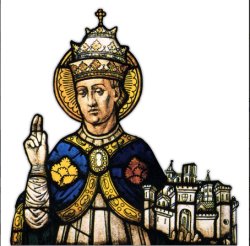
Mr. Berlusconi’s plans to attend the Perdonanza was seen by the Italian public as a gesture in the direction of atonement.
The service was established in the 13th century by Pope Celestine V, who decreed that anyone who entered the basilica on August 28 and 29 could receive a plenary indulgence–if they have already confessed to their sins in private and taken Communion.
In its statement, the Vatican said Mr. Berlusconi’s dinner plans with Cardinal Tarcisio Bertone, who officiated Friday’s service, was called off partly out of concern that the meeting woul be “exploited.” The Vatican official said the Holy See didn’t want to be viewed as giving a “benediction” to Mr. Berlusconi’s political positions and his personal life.
The situation become more complicated and shaded when Gian Maria Vian, editor of the Vatican’s semi-official daily, L’Osservatore Romano, didn’t speak out on behalf of Boffo in an interview with the Italian newspaper Il Courier della Sera. 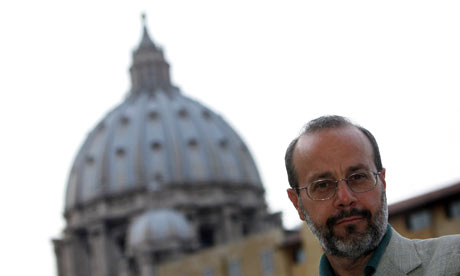
Vian restated the decision of the Holy See’s newspaper not to write about Berlusconi’s private life because the paper is international and is not designed to cover controversies in Italian politics.
Vian further expressed his opinion that some recent editorials in Avenire were exaggerated when, for example, one article compared the government’s position on immigration to that of the Italian administratin prior to the Holocaust.
The comments of Vian were interpreted as constituting a point of contention between the Vatican newspaper and the Italian Bishops’ Conference. Benedict XVI sought to dispel any ideas of a rift by personally calling Cardinal Bagnasco, president of the conference, and affirming his esteem for the episcopal body.
Both in articles published in Avvenire,as well as in the letter to Cardinal Bagnasco tendering his resignation, Boffo, who is married, insists on his innocence and states that Il Giornale‘s accusations are not true.
He thanked the Church for its support, but aded that it “has better things to do than strenuously defend one person, even if unfairly targeted.”
Boffo said he believes the attacks against him are due to the fact that Avvenire is a voice that is independent of “secular power.” He asks, “What future of liberty and responsibility will there be for our information?”
Cardinal Bagnasco expressed in a communique gratitude to Boffo “for the commitment shown over many years with competence, rigor and passion, in fulfilling such a precious assignment for the life of the Church and of Italian society.”
The cardinal also expressed his “closeness and support” to the former director. 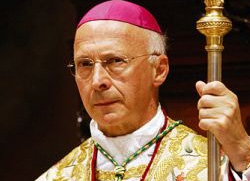
Cardinal Angelo Bagnasco was in the news a few years ago when he claimed that permitting gay marriages was merely the beginning of slippery slope. “Why then say ‘no’ to incest? Why say ‘no’ to the pedophile party in Holland?” he asked.
Draw your own conclusions.
There were no chorus of “Huzzahs!” from American Catholic conservatives for Pope Benedict XVI’s latest encyclical, Caritas in Veritate (“Charity in Truth”). The Vatican released the document on July 7, 2009 – just a day before the opening of the Group of Eight meeting in Italy and the week of president Obama’s visit with the pope.
In fact, there was very little coverage of it at all in conservative Catholic blogs and websites, except for a few who thought Pope Benedict had been hijacked by the Peace and Justice crowd, and that the liberal media gave short shrift on the pope’s passage on family protection and bioethics. In fact, in this document the pope linked economics to modern cultural issues. And ethics.
The pope used Caritas in Veritate primarily to criticize the current economic system, “where the pernicious effects of sin are evident” he growled. The pope urged financiers in particular to “rediscover the genuinely ethical foundation of their activity” and also called for “greater social responsibility” on the part of business. “Once profit becomes the exclusive goal, if it is produced by improper means and without the common good as its ultimate end, it risks destroying wealth and creating poverty.” 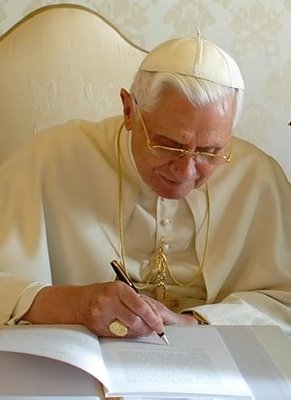
“Today’s international economic scene, marked by grave deviations and failures, requires a profoundly new way of understanding business enterprise,” Benedict stated. “In the search for solutions to the current crisis, development aid for poor countries must be considered a valid means of creating wealth for all.”
John Sniegocki, a professor of Christian ethics at Xavier University in Cincinnati, said one of the most controversial elements of the encyclical, at least for some Americans, would be the call for international institutions to play a role in regulating the economy.
“One of the things he’s saying is that the global economy is escaping the power of individual states to regulate it,” Mr. Sniegocki said. He also said the encyclical also contained elements “very critical” of how the International Monetary Fund and the World Bank “have required cuts in social spending in the third world.”
Caritas in Veritate has infuriated George Weigel, a conservative Catholic intellectual close to Pope John Paul II. Weigel ventured that this social encyclical is a hybrid, “blending the pope’s own insightful thinking on the social order with elements of the Justice and Peace approach to Catholic social doctrine…There is also rather more in the encyclical about the redistribution of wealth than about wealth-creation–a sure sign of Justice and Peace default positions at work.”
“Indeed,” he goes on, “those with advanced degrees in Vaticanology could easily go through the text of Caritas in Veritate, highlighting those passages that are obviously Benedictine with a gold marker and those that reflect current Justice and Peace default positions with a red marker.” (Get it…red marker…commie, pinko, socialist, bleeding heart liberal…sigh.)
Trying to come to terms with this awful document, Weigel opines: “Benedict XVI, a truly gentle soul, may have thought it necessary to include these multiple off-notes, in order to maintain peace within his curial household.”
However, that pat on the head for Pope Benedict doesn’t change anything. In fact, a clue to how he really feels about our unbridled, Bush-era American capitalistic system–and how that opinion is reflect in Caritas in Veritate, came several months before the release of the encyclical during a question-and-answer session with 400 priests ministering in Rome. This session was reported by Zenit, the official Vatican new agency.
A pastor from a poor neighborhood asked how church members could do more to push for a real reform of the global economic system. Pope Benedict said he did not want to give a simplistic answer to a complicated question about the reality of global finance and said that, in fact, the complexity of the current situation is what delayed the publication of his social encyclical, tentatively titled Caritas in Veritate.
On the level of global economic systems, the pope said almost every person in every country is feeling the consequences of “these fundamental errors that have been revealed in the failure of the large American banks; the error at the basis of it is human greed.”
“We must denounce this (system) with courage, but also with concreteness because moralizing will not help if it is not supported by an understanding of reality, which also will help us understand what can be done concretely to change the situation,” he said.
While the global financial system must be reformed, the pope said, individuals also must accept the fact that they will have to make some sacrifices in order to help the poor and move the world toward justice. “Justice cannot be created only with economic reforms, which are necessary, but it also requires the presence of just people,” Benedict said.
Zenit reported that Lesley-Anne Knight, the secretary-general of Caritas Internationalis, a Catholic agency “committed to combating dehumanizing poverty that robs people of their dignity and to promoting the rights of the poor,” said in a press release that the encyclical, which reflects on Pope Paul VI’s encyclical Populorum Progressio (“The Development of Peoples”) “highlights how a blind pursuit of profits over ethics had become detrimental to people and the planet.”
Knight continued: “The crisis exposed systemic failures generated by careless speculation for the benefit of a handful of people and at the expense of millions of poor families. But the crisis offers a unique chance to refashion globalization to work for the majority.”
Read Caritas in Veritate here.
The last time Bishop Gaillot was feted in the United States was at the 1996 Call to Action Conference in Detroit. The title of his address was, “My Option for the Poor.” You can read it here.
After that, I haven’t heard about him. He is a man who deserves never to be forgotten, although that is what Pope John Paul II hoped, when Gaillot was removed from the Diocese of Evreux, France and appointed to an ancient and fictitious see, Partenia.
The See of Partenia, now located in the desert of Algeria, has not existed in reality since the 5th century when it was in Mauritania. But, thanks to the web, Gaillot managed to outwit the Vatican and continues to teach and pastor via the internet as a “virtual bishop.”
“As Partenia does not exist anymore” says Gaillot, “it becomes the symbol of all who feel like non-existing in society or in the Church. It is a huge diocese without borders where the sun never sets.” Travel to Partenia here.
Bishop Gaillot didn’t start off as a radical. Little by little, his contacts with people who came to see him and events to which he chose to respond led him to some unexpected places:
He called on all Catholics to persist in dialog without condemnation so that the church can, as Jesus did, embrace the dispossessed: those marginalized by poverty; those living with AIDS, those in prison, those ostracized for homosexuality; and ultimately, those struggling on the borderlands of their own Christian faith. 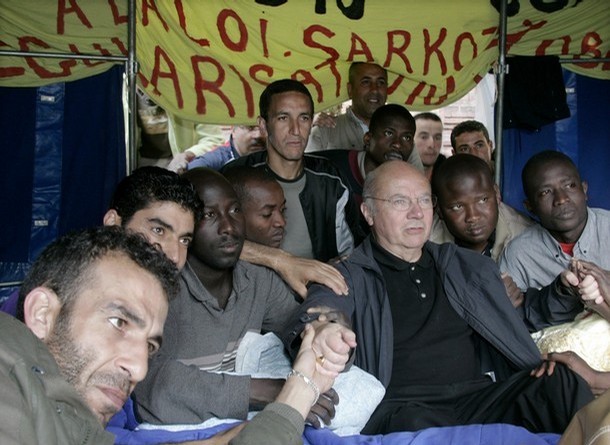
“If we take as our starting point the poor, everything will be renewed – liturgy, catechism, the life of the church. It changes the way we think, pray, our very lifestyle. But if we take as our starting point the Status Quo, we will never be able to catch up with the Good News.”
Gaillot infuriated members of the French Bishops’ Conference and the Vatican with his outspokenness on a number of issues including clerical celibacy, the use of condoms for the prevention of AIDS, ordination of women and married men to the priesthood, and especially, homosexuality.
“The church must be where there is need, and homosexuals have suffered innumerable discriminations. If the church doesn’t free people from oppression, what purpose does it serve?” he asked.
In 1988 Gaillot took the unprecedented step for a Roman Catholic bishop of blessing a homosexual union after the couple requested it in view of their imminent death from AIDS.
He was the only French bishop to participate in the ceremony of the transfer of the ashes of the Abbe Henri-Baptiste Gregoire to the Pantheon, a burial place for “the great men of France.”
Gregoire (1750-1831), a Catholic priest and bishop, was a leading French abolitionist at the turn of the 18th century, a participant in the Revolution of 1789, and a member of its governing assembly.
Gregoire was among the most active deputies of the Assembly, advocated abolishing Negro slavery and granting citizenship to Jews. He objected to some provisions of the Civil Constitution of the Clergy, but agreed to swear the oath of allegiance and was the first member of the clergy to take it (1790). Because of this, the hierarchy of the church refused to give him the last sacraments. (Although he was given them by some sympathetic priests in defiance of the ban.)
After these and other “incidents,” Pope John Paul II relieved Bishop Gaillot of his responsibilities as bishop of Evreux on January 13, 1995. After being removed from his office Bishop Gaillot wrote the following statement:
“I had a dream: to be able to accompany the poor, the excluded, the ignored, without having to explain myself or justify myself to the rich, the secure, or the comfortable. To be able to go where distress calls me without having to give advance notice. To be able to show my indignation at destitution, injustice, violence, the sale of weapons, and managed famines without being considered a meddler in politics.”
“I dreamed of being able to live my faith within the church, but also in society, in my time and with my times. I dreamed of the freedom to think and express myself, to debate and criticise, without fear of the guillotine. I dreamed of the being different within the unity of faith, and remaining myself, alone and yet in solidarity with others. Ultimately, I hoped to be able to proclaim a Gospel of freedom without being marginalised.”
“The church risks becoming a sect. Many Catholics no longer expect anything from this pope. It’s very sad,” Kung said in an interview published by the French newspaper Le Monde on February 24, 2009. 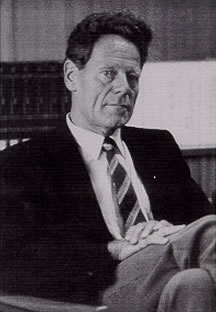
Fr. Kung noted that one of the four traditionalist bishops whose excommunication was lifted by the pope minimized the Holocaust, igniting widespread criticism. The pope’s misjudgement on such an important issue, Kung said, reflected his own isolation.
“Benedict XVI has always lived in an ecclesial environment. He has not traveled much. He’s always remained closed in the Vatican–which is quite similar to how the Kremlin was at one time–where he is safe from criticism,” Fr. Kung said.
Kung went on to way that in his nearly four years in office the pope has shown a lack of pastoral courage and a lack of awareness of the “profound crisis” in the church. He suggested the pope could make several important gestures:
–Allow divorced and remarried Catholics to receive Communion in some circumstances.
–Take steps to “correct” the 1968 encyclical Humanae Vitae and allow the use of birth control in some cases.
–Abolish the rule of priestly celibacy in the Latin-rite church.
–Institute a new way of electing bishops with the involvement of local Catholics.
Fr. Kung said it would be helpful to call a third Vatican council to deal with these and other issues.
Read the Le Monde interview here.
Fr. Kung’s interview provoked some responses that were humorous…or ironic. Here are the best from the web..
Cardinal Angelo Sodano, dean of the College of Cardinals, told Vatican Radio he was “hurt” by reading the interview, and contended that the accusations were “unproven, generic affirmations.”
Cardinal Sodano went on to say “Fraternal criticism has always been possible in the church, from the times of Sts. Peter and Paul. Bitter criticism, on the other hand, especially when it’s so broad, does not contribute to the unity of the church, for which Pope Benedict is working so hard.”
From the blog, Bilgrimage: “Benedict has the reputation for being a great intellectual; yet who more than he has shut down the intellectual life of the Catholic Church, turning it into a sect for the brain-dead.”
From the blog, Enlightened Catholicism: “I expect the blunders will continue unless he decides to launch real reform of the way the church is run. Even in the Vatican you can’t just rely on the Holy Spirit.”
My thanks to the Joseph S. O’Leary homepage, for the above quotes and this rousing call to action: “I suspect in the coming months we will see more initiatives coming from both the laity and clergy calling for real and sustainable change in how Catholicism conducts its business. It will be coming from people who also really love this Church, even the ones who have left in frustration. It’s way past time for these voices to be heard. The conservative wing of this Church has had their say for the last forty years. The results have been disastrous in the West and placing the blame for these results on those who hae left is rather self serving.” 

























